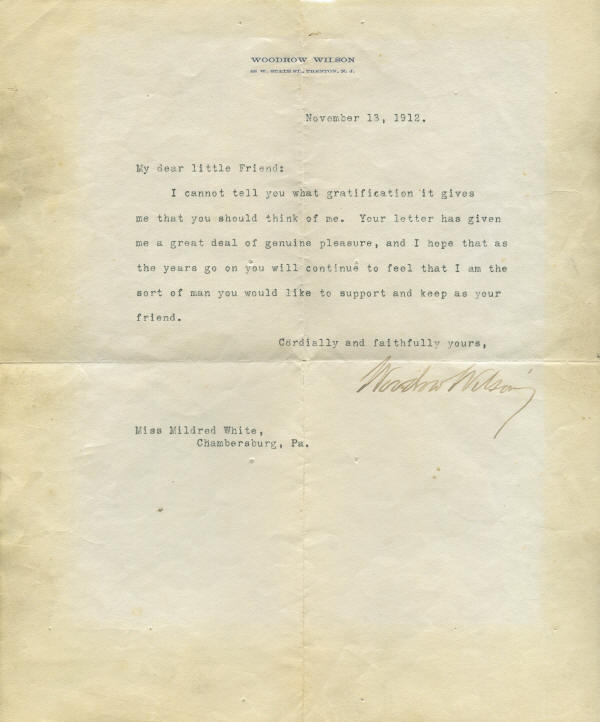532203
Woodrow Wilson
Scroll down to see images of the item below the description
Thomas Woodrow Wilson, 1856-1924. 28th President of the United States, 1913-1921. Typed Letter Signed, Woodrow Wilson, as President-Elect, one page, 8" x 9¾", on personal stationery, Trenton, New Jersey, November 13, 1912.
Eight days after winning the 1912 presidential election, Wilson writes an endearing letter to a little girl. In full: ”My dear little Friend: / I cannot tell you what gratification it gives me that you should think of me. Your letter has given me a great deal of genuine pleasure, and I hope that as the years go on you will continue to feel that I am the sort of man you would like to support and keep as your friend. / Cordially and faithfully yours, / Woodrow Wilson”
One can feel the warmth of Wilson's affection for the child and her letter. Wilson, an academic, wrote mostly uninteresting letters. This one, which conveys more of Wilson's character, is one of the better ones that we have seen.
Wilson, the son of a Presbyterian minister, was born Thomas Woodrow Wilson in Staunton, Virginia. He abandoned a struggling law practice to pursue a doctorate at Johns Hopkins University, then taught college for five years before joining the faculty of Princeton University as a professor of jurisprudence and political economy. He later served as president of Princeton from 1902 until 1910.
Wilson’s growing national reputation led some conservative Democrats to consider him as a potential presidential nominee. New Jersey’s Democratic political machine nominated him for governor, and he won, in 1910. He endorsed a progressive platform during the campaign, however, asserting his independence of both the conservatives and the machine.
Two years later, in 1912, when Theodore Roosevelt challenged his hand-picked successor, William Howard Taft, and split the Republican vote, Wilson was elected President of the United States. He campaigned on a program called the New Freedom, which stressed individualism and states’ rights. He received only 42% of the popular vote but an overwhelming electoral vote.
World War I began during Wilson’s first administration. Wilson tried to keep the United States neutral, and he won reelection in 1916 on the slogan ”He kept us out of war.” But in January 1917 Germany forced Wilson’s hand by announcing that it had begun unrestricted submarine warfare. After four American ships were sunk, Wilson asked Congress to declare war, and it did on April 6, 1917.
His speech to Congress on January 8, 1918, on the “Fourteen Points" was a decisive stroke in winning the war, for people everywhere saw in Wilson's peace aims the vision of a world in which freedom, justice, and peace could flourish. At the Versailles peace conference, Wilson convinced the other nations to include the Covenant of the League of Nations in the treaty, but he suffered a stunning defeat at home when the United States Senate narrowly refused to ratify American membership in the League. The strain of Wilson's massive effort to secure popular support for the League among American citizens caused Wilson to collapse on September 25, 1919, and a week later suffered a cerebral hemorrhage from which he never fully recovered. An invalid, he completed the remaining 17 months of his term with the help of his second wife, Edith Bolling Galt Wilson, and died in retirement three years later.
This letter, which comes from the Ben Benson collection, is in very good to fine condition. It has two mailing folds, one of which barely touches the top of the “W" in “Woodrow,” a few pinholes that affect nothing, and negligible paper loss at the top edge of the page. It is also toned and slightly soiled. Overall this is a nice example, particularly given its warm content.
Unframed. Please ask us about custom framing this piece.
This item has been sold.
Click here to see more items on the Presidents page.





